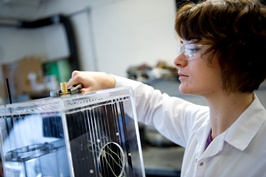Discipline Streams
The research structure of the School is made up of four discipline streams, with three or four groups within each stream. Staff are a member of a primary research group, but the collaborative and multi-disciplinary nature of the School enable cross-group or -stream working.
Civil and Environmental Engineering |
|
 |
Our Civil and Environmental researchers work on a broad range of issues underpinning civil engineering. Combining modelling with practical experimentation, they tackle issues such as: sustainable housing; dynamic loading of structures; earthquake destabilisation of land; and pollution of waterways. |
| Ground Engineering | |
| Structural Engineering | |
| Water | |
Electrical and Electronic Engineering |
|
 |
Power, sustainability and improved communications are at the heart of our Electrical and Electronic stream. Key areas of research include: artificial olfaction (or 'electronic nose'); electrical energy conversion; grid-scale energy storage; nanoscale communications; and quantum devices. |
| Connected Systems | |
| Electrical Power | |
| Sensors and Devices | |
Mechanical and Process Engineering |
||
 |
The largest and most diverse stream, Mechanical and Process Engineering includes: fluid mechanics; fire and explosion hazards; chemical engineering; precision and surfaces; 3D printing; and thermal energy technology. | |
| Fluid Dynamics and Multiscale Modelling | Measurement and Machines | |
| Reaction and Materials Engineering | Sustainable Thermal Energy Technologies | |
Systems and Information Engineering |
|
 |
Systems and Information brings together expertise in: nonlinear and stochastic systems; modelling of human activity; neural engineering; telemedicine; imaging; and synthetic biology. Much of the research undertaken is around health and security and the nature of the work means that many labs are cross-group. |
| Biomedical and Biological Systems | |
| Information Engineering | |
| Systems Modelling and Control | |
